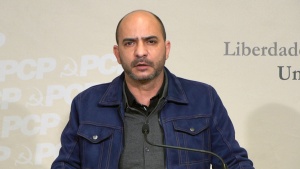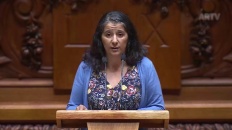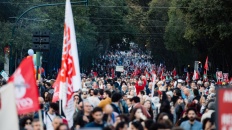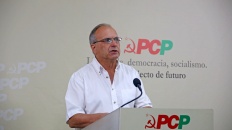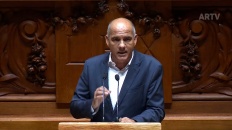The epidemic, having posed new problems, revealed above all the shortcomings and chronic bottlenecks that have been affecting the country for a long time and which require responses. Facing an economic and social crisis like the one underway requires emergency measures, but it is also the time to correct strategic errors and break with a course that has neglected productive activities and heightened external dependence.
In these months, the importance of the country not depending on third parties in matters as central to the functioning of our society like the production of food or medicines has become obvious; it was clear how wrong it has been to impose an economic model that neglects the domestic market and overestimates exports, with emphasis on the growing dependence on both tourism and real estate; there were structural delays in the development of national scientific and technological capacity, and the dependence that is visible as regards large multinationals, ranging from digital to pharmaceuticals; confirms the weakness of an economy that handed over to monopolies - mainly foreigners - banking, energy, communications, parts of transport, the core of its industrial activity; it showed an economic fabric marked by the extreme fragility with which thousands of micro, small and medium-sized companies survive; it confirmed that, in the face of a global crisis, the sectors and companies of the most peripheral countries are sacrificed in the interests of the great powers, as shown by the closures of industrial units, like the Matosinhos refinery or the Sines thermal power plant, or the process underway at TAP that threatens the company's future as a flag carrier and a strategic and sovereign instrument; and it emphasized, once again, the straightjacket that constitutes submission to the Euro and what it represents, either as a stranglehold to the necessary increase in public investment - which is today half of what it was a decade ago -, whether in the weakness encountered by an economy that has to cart a currency that, in practice, is not its.
This is the time to make fundamental choices by drawing lessons from the current situation. Portugal needs to set in motion a real development programme and not a path dictated by the criteria and agenda chosen and guided by the great powers of the European Union.
This is the time to face seriously at the main national deficits and bottlenecks, but also to observe the existing resources and potential and redirect the national economy towards a policy of replacing imports with national production. We realise the obvious: a country that does not produce has no future. The PCP wants the obvious to be done: to get Portugal to produce.
Among the various existing needs, we highlight four fundamental vectors for the development of national production that are simultaneously linked to the rupture with four large chains of external dependence that need to be reversed.
First and foremost, food production, seize the advantage of the good conditions, with the mobilisation of small and medium-size farmers, satisfying the needs of the population, guaranteeing the occupation of the territory and ensuring food sovereignty - particularly in strategic sectors such as meat, cereals or fish.
The production of medicines and medical equipment, including the promotion of the National Drug Laboratory - as an essential structure for the safety and health of the Portuguese people - and its articulation with other components of the national industry.
The production of equipment and means of transport, using the installed capacity for production, repairs and maintenance - from EMEF currently integrated in CP railways, the maintenance of TAP and other companies in civil and military aviation, to shipbuilding, with emphasis on the Arsenal do Alfeite and other existing shipyards.
The production of energy, with the mobilisation of resources that aims at energy sovereignty, promotes the rational use of energy and increases efficiency in transport, buildings and industry and the diversification of energy sources, the prospecting and mapping of resources, the reassessment of the policy of incentives, subsidies and support to economic groups, inseparable from a policy that ensures the recovery of public control over this strategic sector and the fight against environmental degradation.
The identification of these four vectors does not abolish, but rather articulates with all other dimensions of economic policy:
- from the outset with the defence of the country's productive assets, which today ensure important strategic productions - such as milk - which are increasingly undermined by EU policies and the government's options;
- The valorisation of the existing industrial base - be it in the mining industry, or of transformation - and the development possibilities that it entails;
- reducing the dependence on the outside of the imported component of our exports, boosting the production not only of final products but also intermediates – 50% of which are currently imported - to expand and strengthen the national added value segments - in the policies of occupation of the soil and use of marine resources;
- the adoption of guidelines within the framework of a gradualist energy transition and subject to the dynamics and interests of the development and defence of the national economy and production, and not determined or subordinated by a European division of labour according to the agendas and strategies of the EU and the great powers;
- The necessary policy to diverse economic relations with other countries on a mutually advantageous basis;
- Support for MSMEs;
- incorporating to serve national development the scientific and technological advances that are underway, namely in terms of digitization and robotization;
- the strengthening of Public Services and Public Administration structures, with the recovery of deactivated or dismantled structures, namely the study and planning offices, and assuming, without neoliberal prejudices, all the potential of a State that produces goods and services;
- a policy of full employment pointed out by the Constitution of the Republic as a national goal;
- the necessary increase in wages and the expansion of domestic consumption capacity, as well as the defence of the interests of small-scale agriculture and fisheries.
The proposal that we are putting forward today requires political decisions in the opposite direction of those that have been imposed by successive governments. It also requires the mobilization of large financial resources and means that must be managed with criteria.
We point out three ways of funding for the investment that we think is necessary in adopting a policy to promote national production:
- The reinforcement of public investment with own national resources, namely through the State Budget;
- the maximum use, without previous constraints, of the funds resulting from the combination of the Multiannual Financial Frameworks (the current and the next) and the so-called Recovery Fund (which together represent around 50 billion euros according to official sources);
- availing of the possibilities opened up by the situation of low interest rates, mobilizing resources for judicious investments and with return.
The PCP is not alone in the struggle for national production. We are accompanied by many of those who have already understood that the future of the country is not built by de-industrializing, abandoning land and sea, handing to foreign capital what the Portuguese people built over centuries. We know that this outlook of defending national interests faces powerful obstacles, from the outset the wrong options of the PS government tied to the impositions of the EU, but also of those who are in a hurry to return to the scorched earth policy that marked the period of the SGPs, of the Pact of Aggression of the Troika.
To defend the right to produce, is to defend the right to employment, to decent wages, to a development that preserves the environment, it is to defend national sovereignty and no longer have a country dependent on abroad, on markets, on the EU. It is for this sovereign country, for this Portugal with a future that we will continue to fight.
